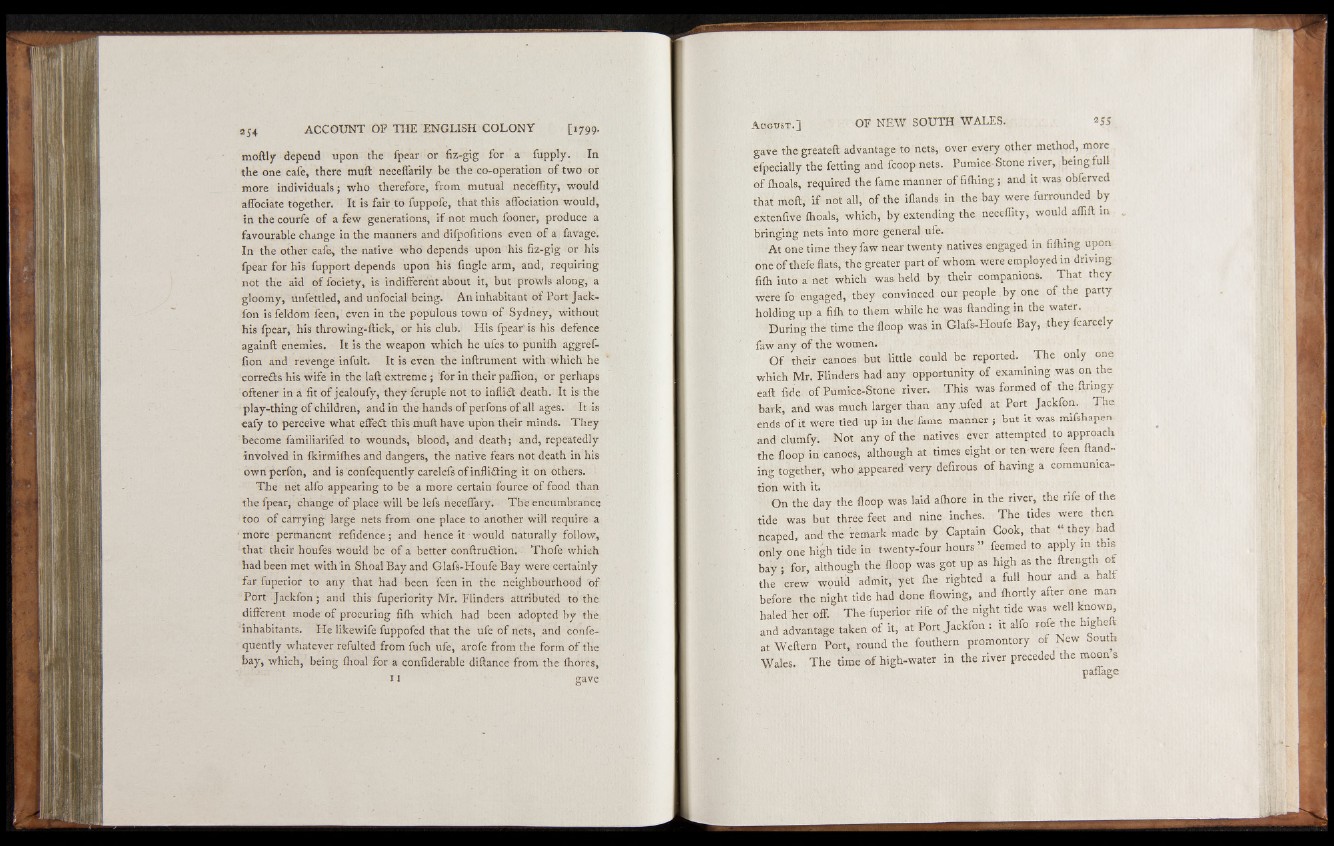
moftly depend upon the fpear or fiz-gig for a fupply. In
the one cafe, there muft neceffarily be the co-operation o f two or
more individuals; who therefore, from mutual neceffity, would
affociate together. It is fair to fuppofe, that this affociation would,
in the courfe o f a few generations, i f not much fooner, produce a
favourable change in the manners and difpofitions even of a favage.
In the other cafe, the native who depends upon his fiz-gig or his
fpear for his fupport depends upon his Angle arm, and, requiring
not the aid of fociety, is indifferent about it, but prowls along, a
gloomy, unfettled, and unfocial being. An inhabitant of Port Jack-
fon is feldom feen, even in the populous town o f Sydney, without
his fpear, his throwing-ftick, or his club. His fpear' is his defence
againft enemies. It is the weapon which he ufes to punifli aggref-
fion and revenge infult. It is even the inftrument with which he
corrects his wife in the laft extreme ; for in their pafiion, or perhaps
oftener in a fit of jealoufy, they fcruple not to inflidt death. It is the
play-thing of children, and in the hands o f perfons of all ages. It is
eafy to perceive what effect this muft have upon their minds. They
become familiarifed to wounds, blood, and death; and, repeatedly
involved in fkirmifhes and dangers, the native fears not death in his
ownperfon, and is confequently carelefs o f inflicting it on others.
The net alfo appearing to be a more certain fource o f food than
the fpear, change of place will be lefs neceffary. The encumbrance
too o f carrying large nets from one place to another will require a
more permanent refidence; and hence it would naturally follow,
that their houfes would be o f a better conftrudtion. Thofe which
had been met with in Shoal Bay and Glafs-Houfe Bay were certainly
far fuperior to any that had been feen in the neighbourhood of
Port Jackfon ; and this fuperiority Mr. Flinders attributed to the
different mode o f procuring fifh which had been adopted by the.
inhabitants. He likeWife fuppofed that the ufe o f nets, and confequently
whatever refulted from fuch ufe, arofe from the form o f the
bay, which, being flroal for a confiderable diftance from the lhores,
1 gave
25S
gave the greateft advantage to nets, over every other method, more
efpecially the fetting and fcoop nets. Pumice-Stone river, being full
o f Ihoals, required the fame manner o f fithing ; and it was obferved
that moft, i f not all, o f the iflands in the bay were furrounded by
extenfive Ihoals, which, by extending the neceflity, would afiift in ,
bringing nets into more general ufe.
At one time they faw near twenty natives engaged in filhing upon
one o f thefe flats, the greater part o f whom were employed in driving
fifh into a net which was held by their companions. That they
were fo engaged, they convinced our people by one of the party
holding up a fifh to them while he was ftanding in the water.
During the time the floop was in Glafs-Houfe Bay, they fcarcely
faw any o f the women.
Of their canoes but little could be reported. The only one
which Mr. Flinders had any opportunity o f examining was on the
eaft fide of Pumice-Stone river. This was formed o f the ftringy
bark, and was much larger than any .ufed at Port Jackfon. The
ends of it were tied up in the fame manner ; but it was mifshapen
and clumfy. Not any of the natives ever attempted to approach
the floop in canoes, although at times eight or ten-were feen ftanding
together, who appeared very defirous o f having a communica-
tion with it.
On the day the floop was laid afhore in the river, the rife of the
tide was but three feet and nine inches. The tides were then
neaped, and the remark made by Captain Cook, that “ they had
only one high tide in twenty-four hours” feemed to apply m tins
bay ; for, although the floop was got up as high as the ftrength o f
the crew would admit, yet fhe righted a full hour and a half
before the night tide had done flowing, and fhortly after one man
haled her off. The fuperior rife o f the night tide was well “ own,
and advantage taken of it, at Port Jackfon : it alfo # e t h e highe
at Weftern Port, round the fouthern promontory of New South
Wales. The time o f high-water in the river preceded the moon s
paflage